【精选】人教版八年级下英语期中考试复习:知识点讲义(unit1-unit5)
Unit1-5话题作文(书面表达)归纳期中复习10篇-人教版英语八年级下册

八下单元话题作文期中复习归纳10篇Unit 1 What’s the matter?第一篇上周的体育课上,李明打篮球时严重摔伤了腿,引发了学校对“体育课安全”的关注,学校要求体育委员在班会上讲一讲这个问题,请你以“How to keep safe in P. E. class?”为题, 在班会课上作主题发言。
要求:语句连贯,词数90左右。
How to keep safe in P. E. class?Good afternoon, everyone!Do you know that we'll be in danger in P. E. class if ___________________________________________ _______________________________________________________________________________________ _______________________________________________________________________________________ _______________________________________________________________________________________ _______________________________________________________________________________________ That's all. Thank you.第二篇在中国学习的英国交换生吉尔(Jill)近期总是头痛,她到医院诊治多次,但效果不佳。
她听说中医保健治疗效果不错,就登录了中国某健康网留言咨询中医孟大夫。
假如你是孟大夫,请你根据以下提示,用英语写一篇短文,回复吉尔。
人教版八年级下册英语 Unit 1-5 复习知识点考点汇编
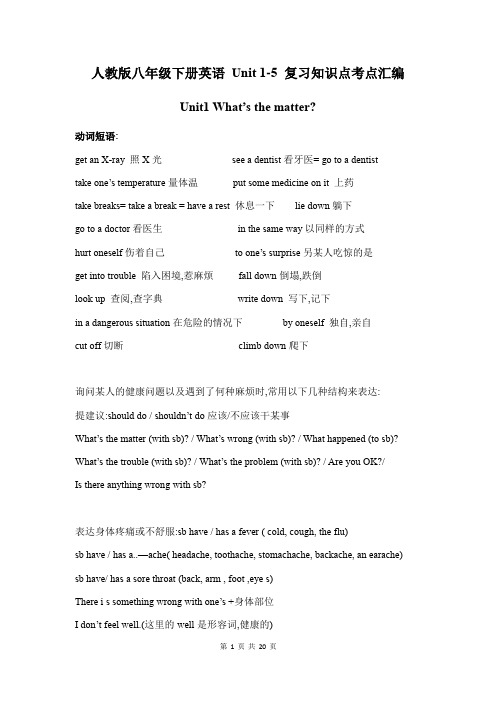
人教版八年级下册英语U nit 1-5 复习知识点考点汇编Unit1 What’s the matter?动词短语:get an X-ray 照X光see a dentist看牙医= go to a dentist take one’s temperature量体温put some medicine on it 上药take breaks= take a break = have a rest 休息一下lie down躺下go to a doctor看医生in the same way以同样的方式hurt oneself伤着自己to one’s surprise另某人吃惊的是get into trouble 陷入困境,惹麻烦fall down倒塌,跌倒look up 查阅,查字典write down 写下,记下in a dangerous situation在危险的情况下by oneself 独自,亲自cut off切断climb down爬下询问某人的健康问题以及遇到了何种麻烦时,常用以下几种结构来表达:提建议:should do / shouldn’t do应该/不应该干某事What’s the matter (with sb)? / What’s wrong (with sb)? / What happened (to sb)? What’s the trouble (with sb)? / What’s the problem (with sb)? / Are you OK?/Is there anything wrong with sb?表达身体疼痛或不舒服:sb have / has a fever ( cold, cough, the flu)sb have / has a..—ache( headache, toothache, stomachache, backache, an earache) sb have/ has a sore throat (back, arm , foot ,eye s)There i s something wrong with one’s +身体部位I don’t feel well.(这里的well是形容词,健康的)Let’s +动词原形./ What (How) about doing sth ? / Why not ( Why don’t you ) do? You’d better do / You’d better not do 最好干某事/最好不要干某事too much + 不可数名词:too much homework 动词+too much : talk too muchtoo many+可数名词复数:too many students much too + adj/ adv : much too tiredhot tea with honey 加蜂蜜的热茶(这里的with是后置定语,修饰tea)away from :远离Stay away from fire.远离火A地离B地的具体距离具体的距离+away from : My home is 500 meters away from my school.Far from:A地离B地很远My home is far from my school.(具体多远不知道)lie 动词,躺、位于,过去式lay , 过去分词lain, 现在分词lying动词,说谎,过去式lied, 过去分词lied, 现在分词lying名词,谎言tell a lie = tell lies说谎lay 动词,下蛋,产卵,放置,过去式laid, 过去分词laid, 现在分词layingsee sb doing sth看见某人正在干某事see sb do sth看见某人干某事的全过程shout for help 大声呼救shout at sb对某人大喊大叫shout to sb对某人大声说话without thinking twice毫不犹豫,不假思索get on 上车get off 下车(大型交通工具)get into / get out of (电梯、出租车等小型交通工具)expect sb to do sth期待某人干某事expect sb not to do sth期待某人不要干某事agree to do sth同意干某事thanks to 多亏了,幸亏= because of = with the help ofin time 及时on time 按时,准时right away=right now = at once立即马上think of想起,认为think about 考虑think about doing sth考虑干某事think over 仔细考虑hit sb in / on +身体部位(软的部位用in,硬的部位用on)run it under water用水冲洗put a bandage on it 用绷带包扎Knives are used to cut things.have trouble (in) doing sth = have problems/difficulty (in) doing sth干某事有麻烦/问题/ 困难have trouble with sth= have problems with sth = have difficulty with sth在某方面有困难be / get used to doing sth 习惯于干某事I am used to getting up early.我习惯了早起used to do sth过去常常干某事(暗示现在不干了)I used to get up early. (暗示现在不。
人教版八年级英语下册Unit1-Unit5_短语句型归纳

Unit1-Unit5 短语句型归纳Unit 1 What’s the matter?1. have a fever 发烧2. have a cough 咳嗽3. have a toothache 牙疼4. talk too much 说得太多5. drink enough water 喝足够的水6. have a cold 受凉;感冒7. have a stomachache 胃疼8. have a sore back 背疼9. have a sore throat 喉咙痛10. lie down and rest 躺下来休息11. hot tea with honey 加蜂蜜的热茶12. see a dentist 看牙医13. get an X-ray 拍X 光片14. take one’ s temperature 量体温15. put some medicine on sth. 在……上面敷药16. feel very hot 感到很热17. sound like 听起来像18. all weekend 整个周末19. in the same way 以同样的方式20. go to a doctor 看医生21. go along 沿着……走22. on the side of the road 在马路边23. shout for help 大声呼救24. without thinking twice 没有多想25. get off 下车26. have a heart problem 有心脏病27. to one’s surprise 使.......惊讶28. thanks to 多亏了;由于29. in time 及时30. save a life 挽救生命31. get into trouble 造成麻烦32. right away 立刻;马上33. because of 由于34. get out of 离开;从……出萍35. hurt oneself 受伤36. put a bandage on sth. 用绷带包扎37. fall down 摔倒38. feel sick 感到恶心39. have a nosebleed 流鼻血40. cut his knee 割伤他的膝盖41. put her head back 把她的头向后仰42. have problems breathing 呼吸困难43. mountain climbing 登山运动44. be used to doing sth. 习惯做某事45. run out (of) 用完;用尽46. so that 以便47. so. . . that 如此… …以至于…48. be in control of 掌管;管理49. in a difficult situation 在困境中50. keep on doing sth. 继续或坚持做某事51. make a decision 做出决定52. take risks 冒险53. give up 放弃二、重点句型1. Wha t’ s the matter?Wha t’ s the matter with you?= What’s the trouble w ith you?= Wha t’ s wrong with you?你怎么了?2. What should she do?她该怎么办呢?Should I take my temperature?我应该量一下体温吗?主语+ should/shouldn’t + 动词原形. ..①You should lie down and rest.你应该躺下休息一会儿。
最新人教版八年级下英语期中复习知识点讲义(Unit1-Unit5)

最新人教版八年级下英语期中复习知识点讲义(Unit1-Unit5)Unit 1: What's the Matter?In this unit。
we will focus on two grammar points: the use of the modal verb "should" and reflexive pronouns。
We will also discuss the topic of health in our writing。
Here are some XXX:1."Have a + disease" (e.g。
"have a cold")2.XXX: "What's wrong?" "What's wrong with you?" "What's your trouble?" "What's the trouble with you?"3."Lie" can mean both "to recline" (e.g。
"She should lie down") and "to tell a falsehood" (e.g。
"She lied again")。
"Lay" means "to put something down" (e.g。
"The hen is laying an egg").4.XXX with "if" (e.g。
"If I have time。
I will go to the gym").5."Surprise" can be used as a verb (e.g。
八年级英语下期中复习知识点讲义(人教版Unit1-Unit5)
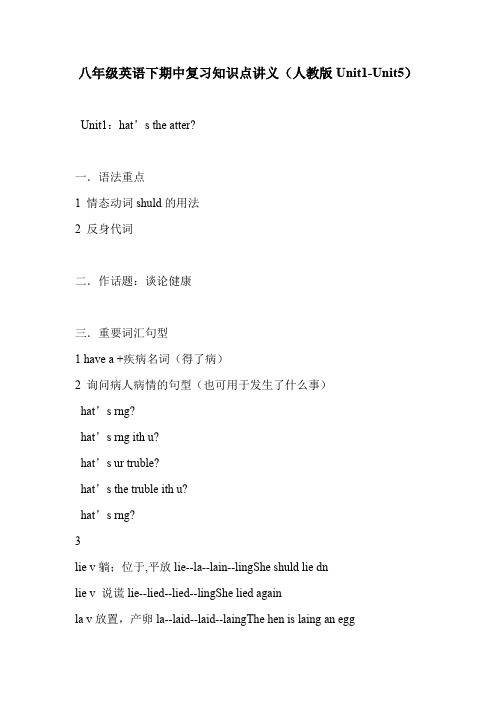
八年级英语下期中复习知识点讲义(人教版Unit1-Unit5)Unit1:hat’s the atter?一.语法重点1 情态动词shuld的用法2 反身代词二.作话题:谈论健康三.重要词汇句型1 have a +疾病名词(得了病)2 询问病人病情的句型(也可用于发生了什么事)hat’s rng?hat’s rng ith u?hat’s ur truble?hat’s the truble ith u?hat’s rng?3lie v躺;位于,平放lie--la--lain--lingShe shuld lie dnlie v 说谎lie--lied--lied--lingShe lied againla v放置,产卵la--laid--laid--laingThe hen is laing an egg4 If引导的条状语从句(主将从现)surprise:(1)surprise sb吓到某人(2)be surprised at对感到吃惊(3)be surprised t d sth做某事令人感到吃惊(4)in surprise惊奇地6 agree:(1)agree t d sth 同意做某事(2)agree ith sb 同意某人(3)agree n sth双方就某事达成一致(4)agree that+that从句同意7 truble:(1)get int truble陷入困境(2)be in truble处于困境(3)get sb int truble使某人陷入困境(4)have truble ith sth在某事方面有困难()have truble (in) ding sth在做某事方面有困难8 use(1)be/get used t ding sth习惯于做某事(2)used t d sth过去常常做某事(3) sth be used t d某物被用做(表被动关系)(4)sth be used fr ding sth某物用于/被用于做某事(强调用途)9 tae a ris/tae riss冒险at ris在危险中at the ris f ding sth冒生命危险做某事10 run ut(花光:物作主语)run ut f(人作主语)=use up11 ean t d sth打算做某事ean ding sth意味着做某事12 iprtant(ad)----uniprtant(ad不重要的)----iprtane(n)13 be in ntrl f 掌管,控制14 ut词组:1 ut ut删除;删去2 ut up切碎3 ut ff切掉;停止4 ut dn 砍到;降低ut in插嘴;超车;插队Unit2: I’ll help t lean up the it pars一.语法重点1 动词不定式2 动词短语二.作话题:提供帮助,义务活动三.重要词汇句型1 vlunteer:v自愿(做某事)vlunteer t d sth vlunteer fr sthn 志愿者ad 志愿的;自愿的a vlunteer b2 疑问词+动词不定式=宾语从句I reall an’t deide here I shuld g=I reall an’t deide here t g3 suh+a(n) +形容词+名词=s+形容词+a(n)+名词She is suh a beautiful girl=She is s beautiful a girl4 satisfatin(n满意)--satisf(v使满意)--satisfied(ad满意的)--satisfing(令人满意的)t ne’s satisfatin使/令某人满意/满足be satisfied ith对感到满意be satisfied t d sth 对做某事感到满意raisefr为筹集6 l lie外表上看起像tae after指因血缘关系在性格,性格,行为上相像7 ae/thin/find/believe/feel it +形容词+t d sth 使/觉得/发现/相信/感觉做某事8 ae a differene t对产生影响9 iagine: (1)iagine ding sth想象做某事(2)iagine sb t d sth想象某人做某事(3)iagine that/hat 想象10 train: v 训练n 火车training n训练;培训(1)train sb/sth t d sth训练某人/某物去做某事(2)train sb in sth 在某方面训练/培养某人11 understand=fll=ath理解;听懂understanding ad善解人意的;体谅人的12 hange v 改变;变化hange ne’s life hangeintn 零钱(不可数名词)改变(可数名词hanges)13 短语:heer up (使)变得高兴;振奋起give ut分发;散发e up ith想出;提出put ff推迟hand ut分发all up打电话给某人;征召are fr照顾;非常喜欢tr ut 参加选拔;试用fix up修理;装饰give aa赠送;捐赠tae after(外貌或行为)像Unit3:uld u please lean ur r?一.语法重点1 情态动词uld用法(请求和征求许可)二.作话题:对某事某物的看法(议论)三.重要词汇句型1 in a ess乱糟糟;一团糟ae a ess f (ding) sth 把(做)某事搞得一团糟2 s +助动词/系动词/情态动词+主语(也)neither助动词/系动词/情态动词+主语(也不)He ill g t Hangzhu fr a hlida trr S ill I3 pass v 经过;穿过pass the superaret通过(考试;会议);合格或者及格pass the final exa(时间的)过去,流逝A ear passed quil4 brr sth brr sth fr sb (借进:说话人向别人借东西)lend sb sth lend sth t sb (借出:说话人把自己的东西借给别人eep“借”或“保留”多长时间,与一段时间连用ae:(1)ae sb d sth I ade ther laugh(2)ae+宾语+形容词(宾语补足语)I ade ther sad6 aste: a aste f 浪费a aste f neaste sth浪费某物aste sth in ding sth浪费做某事7 prvide 提供;供应prvide sb ith sth= prvide sth fr sbsuppl sb ith sth=suppl sb ith sthffer sb sth=ffer t d sth8 develp(v发展)--develped(ad发达的)--develping(ad发展中的)--develpent(n发展)develp ne’s interest in培养某人对的兴趣9 drp与fall 落下;掉下;降下(作不及物动词时,一般可互换)drp还可作及物动词,而fall 不可10 短语:depend n依靠;依赖tae are f 照顾;处理Unit4: h dn’t u tal t ur parents?一.语法重点1 提建议和回答提建议的表达方式2 until, s that及althugh引导的状语从句二.作话题:就某一现象提建议三.重点词汇句型1 all sb t d sth允许某人做某事all ding sth允许做某事2 find sb ding sth发现某人正在做某事find sb t d sth 发现某人做了某事3 get n (ell/badl)ith sb 与某人相处的好/坏4 argue ith sb abut sth 为某事与某人争论instead与instead finstead:代替;相反副词,通常放在句首或句末,表示前面的事情没有做,而做了后面的事He didn’t anser; instead, he ased his father instead f:代替;而不是介词短语,后面可跟与前面的并列成分相对应的名词、代词、动名词形式u shuld be ring instead f ling in bed6 特殊疑问词+ever=n atter+特殊疑问词hever=n atter h7 ffer t d sth主动提出做某事ffer sb sth=ffer sth t sb给某人提供某物8 uniate ith sb与某人沟通,交流uniate sth t sb把通知/传达给某人9 return sb sth= return sth t sb=give ba10 nt an re(不再)=n rentan lnger=n lnger(不再)11 put pressure n sb向某人施压12 pete ith/against sb和某人竞争13 ntinue/g n ding sth继续做同一事ntinue/g n t d sth继续做某事(不是同一事)14 pare A ith B把A与B做对比/比较(用比较相似事物的不同点)pare A t B把A比作B(用比较不同事物间的相同点)16 ause sb t d sth促使某人做某事ause sth (t/fr sb)(给某人)带17 词组:l thrugh快速查看;浏览r ut成功的发展;解决get n ith和睦相处;关系良好ut ut删除;删去pareith比较;对比Unit: hat ere u ding hen the rainstr ae?一.语法重点1 过去进行时2 hen与hile的区别二.作话题:描述过去发生的某事三.重点词汇句型1 light: 1)n 光;光线(不可数名词)2)n 电灯;光(可数名词)3)ad轻的;浅色的4)v 点燃;照亮light---lighted/lit---light/lit2 reprt v报告n 报告reprter n 记者3 d n 木头;木(不可数名词)小树林(可数名词,常用复数)den ad木制的4 beat 1)v 击打2)心脏等跳动3)打败;战胜(后接人或由人组成的队)against 1)反对fr支持e are against ar and fr peae2)靠着,倚着The b std against the dr6 rise与raiserise增加;提高;增强;上升;升起不及物动词,主语常为物The river rse after the heav rainraise使升起;提高;举起及物动词,主语常为人He raised his hands 7 realize v 1)意识到;认识到2)实现(梦想、愿望)realize ne’s drea=ae ne’s drea e true=ahieve ne’s drea8 ae ne’s a t在某人去的路上,前往途中9 短语:at first 起初;起先fall asleep进入梦乡;睡着die dn逐渐变弱;逐渐消失ae ne’s a前往;费力地前进tae dn拆除,往下拽;记录g ff水电断掉;离开;爆炸;食物变坏。
2021--2022学年人教版八年级下学期英语 Unit 1--5期中复习知识点总结
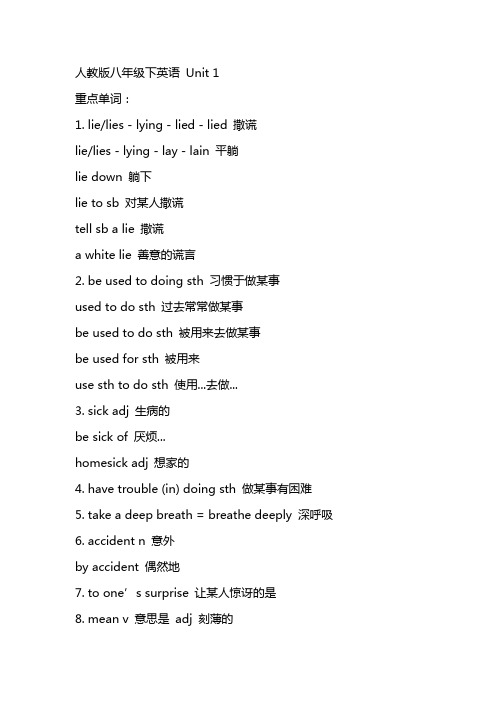
人教版八年级下英语Unit 1重点单词:1.lie/lies - lying - lied - lied 撒谎lie/lies - lying - lay - lain 平躺lie down 躺下lie to sb 对某人撒谎tell sb a lie 撒谎a white lie 善意的谎言2.be used to doing sth 习惯于做某事used to do sth 过去常常做某事be used to do sth 被用来去做某事be used for sth 被用来use sth to do sth 使用...去做...3.sick adj 生病的be sick of 厌烦...homesick adj 想家的4.have trouble (in) doing sth 做某事有困难5.take a deep breath = breathe deeply 深呼吸6.accident n 意外by accident 偶然地7.to one’s surprise 让某人惊讶的是8.mean v 意思是adj 刻薄的meaning n 意义meaningful adj 有意义的mean to do sth 打算去做某事mean doing sth 意味着做某事9.decide v 决定decide to do sth 决定去做某事decision n 决定make a decision = make decisions 做决定decisive adj 果断的10.die v 死亡die/dies - dying - died - dieddying adj 濒临死亡的dead adj 死了的deadline n 最后期限11.give up 放弃give in 屈服give off 散发(光/热)give out 分发,散发give away 给出give/gives - giving - gave - given12.take a break - take breakshave a rest13.take a risk - take risks14.run out/run out of 用光,用尽15.along prep/adv沿着alone adj/adv单独地lonely adj孤独的16.see sb doing sth 看见某人正在做某事see sb do sth 看见某人做过某事17.stop doing sth 停止正在做的事情stop to do sth 停下来去做某事18.shout for help 大声呼救19.on the side of road 在路边20.24-year-old adj 24岁的21.be interested in sth 对...感兴趣22.in time 及时on time 准时at times = sometimes 有时23.because 和so 不能连用;although 和but 不能连用because + 句子because of + 名词或名词短语24.by oneself = on one’s own 靠某人自己25.expect sb to do sth 期待某人去做某事26.be ready to do sth 准备去做某事27.agree to do sth 同意去做某事28.keep doing sth 一直做某事29.the same as 和...一样as ... as 像...一样30.hurt - hurt - hurthit - hit - hitfall - fell - fallenkeep - kept - kept31.one of + 名词复数+ 谓语动词单数32.time 时间不可数time 次数可数33.so... that 如此...以至于34.疾病类have a headache 头痛have a sore throat 嗓子疼have a stomachache 胃疼have a sore back 背痛have a fever 发烧have a toothache 牙痛have a cold 感冒have a heart problem 有心脏问题语法点:定语从句+ 宾语从句并列句人教版八年级英语下unit 2知识点重点词组:1.clean up 打扫干净2.cheer up 使变得高兴3.give out 分发,散发4.hand out 分发e up with 提出6.put off 推迟,拖延7.call up 打电话给某人8.care for 照顾,非常喜欢9.try out 参加...选拔,试用10.fix up 修理,修饰11.give away 赠送12.take after 像13.set up 建立14.make a difference 影响,有作用15.a strong feeling of satisfaction 强烈的满足感16.at the age of = when sb is ...years old17.go on a different journey 进行不同的旅行e true 实现19.at the same time 在同时20.make it possible for sb to do sth 使某人去做某事成为可能(注意it 形式宾语)21.a special trained dog 一个经过训练的狗(注意trained过去分词作定语,被训练过的)重点单词:1.volunteer n 志愿者;v 义务做voluntary adj 自愿的2.sign n标志,信号sigh v 叹息3.notice v 注意到;n 通知,通告a short notice 临时通知4.lonely adj 孤独的,寂寞的alone adv 独自地5.several adj 几个的6.strong adj 强烈的,强壮的7.feeling n 感觉feel v 感觉feel-felt-felt8.satisfaction n 满意satisfy v 使满意satisfied adj 满意的(个人感到满意)be satisfied with sth 对...满意satisfactory adj 满意的(物品令人满意)9.joy n 开心pleasure n 开心happiness n 幸福10.owner n 拥有者own v 拥有;adj 自己的11.journey n 旅行(长途)trip 旅行(短途)voyage 旅行(游船飞船)travel 旅行12.raise v 抬起,饲养,筹集raise money 筹钱raise a pet 饲养宠物13.midnight n 午夜14.repair v 修理15.broken adj 破碎的break v 打破break - breaking - broke - broken16.wheel n 轮子17.letter n 信,字母18.disabled adj 丧失能力的19.blind adj 盲的the blind 盲人+ 谓语动词复数20.deaf adj 聋的21.imagine v 想象imagination n 想象力imaginative adj 充满想象力的image n 图片22.difficulty n 困难have difficulty doing sth 做某事有困难23.open v 打开;adj 开着的close v 关闭;closed adj 关闭的24.carry v 拿,提,扛25.train n 火车;v 训练training n 训练trainers 运动鞋26.excited adj 感到兴奋的exciting adj 令人感到兴奋的27.kindness n 善良kind adj 有好的be kind to sb 对某人友好= be friendly to sb28.clever adj 聪明的smart adj 聪明的intelligent adj 聪明的29.understand v 理解understand - understanding - understood - understood misunderstand v 误解understanding n 理解have a better understanding of sth 对....有更好的理解30.change v、n 改变31.interest n 兴趣be interested in sth 对...有兴趣interesting adj 有趣的Unit3重点词组:1.take out the rubbish 倒垃圾2.all the time 一直,反复3.as soon as 一...就...4.in order to do sth 为了...in order that ... 为了+ 从句5.take care of = look after 关心,照顾6.do the dishes 洗盘子7.make one’s bed 整理床铺8.sweep the floor 清扫地板9.at least 至少10.finish doing sth 结束做某事11.in front of 在...前面12.take the dog for a walk 遛狗13.help out around the house 在家里帮忙14.work all day 工作一整天15.in surprise 惊讶地16.go to the movies 去看电影17.help with sth = help sb to do sth = help sb do sth18.spend ... on + nspend ... (in) doing sthspend ... with sb19.mind doing sth 介意做某事20.do one’s part in doing sth 在做某事方面尽到责任21.have no idea 不知道22.fall ill 生病重点单词:1.rubbish n 垃圾(英式)rubbish bin 垃圾桶(英式)garbage n 垃圾(美式)garbage can 垃圾桶(美式)2.fold v 折叠unfold v 打开3.sweep v 打扫sweep the floor 清扫地板sweep - swept - swept4.mess n 杂乱messy adj 杂乱的5.throw v 扔throw - threw - thrown throw away 扔掉drop v 丢掉,下降drop - dropped - dropped 6.neither adv/pron. 两者都不neither ... nor 既不...也不either ... or 要么...要么7.shirt n 衬衫T-shirt T恤polo polo衫blouse 女式衬衫8.pass v 通过pass away 去世pass down 传递9.borrow v 借来borrow fromlend v 借给lend to10.finger n 手指fingertip 指尖finger nail 指甲toe 脚趾11.hate v 讨厌hate to do sth = hate doing sth 12.chore n 家务do chores = do housework13.while 当,然而14.snack n 零食have a snack 吃零食15.stress n (精神,心理)压力reduce stress 减少压力pressure n (物理)压力release pressurepress v 按压16.waste v 浪费;n 垃圾a waste of time 浪费时间waste time 浪费时间17.provide v 提供provide sth for sb = provide sb with sth 提供某人某物offer sb sth 提供某人某物supply sb with sth = supply sth for(to) sb 提供某人某物18.anyway 而且,加之(用于转换话题)19.depend v 取决于independent adj 独立的independence n 独立depend on = rely on = count on 依赖20.develop v 发展developed country 发达国家developing country 发展中国家21.fairness n 公平fair adj 公平的unfair adj 不公平的22.since 自从,因为23.neighbor n 邻居(美式)neighbour n 邻居(英式)neighborhood 社区24.ill adj 生病的illness n 疾病sick adj 生病的重点句型:1.if 引导的条件状语从句,主将从现2.as...as 像...一样3.neither + 谓语+ 主语主语也不4.it is + adj for sb to do sth5.the + 比较级,the + 比较级人教版八年级下英语unit 4 知识点总结重点词组:1.what’s wrong 哪不舒服?what’s wrong with sb 某人怎么了?2.look through 快速查看,浏览look up 查询look for 寻找look after 照顾look out = watch out 当心3.big deal 重要的事it’s not a big deal 不是要紧的事4.work out = figure out 解决,弄明白5.not...anymore 再也不6.cut out 删去pare...with 比较8.in one’s opinion 在某人看来9.hang out with sb 和某人闲逛10.after-school class 校外辅导课11.get into fight with sb 和某人打起来12.be angry with sb 对某人生气13.why don’t you do = why not do sth 为什么不做某事14.get on with sb 和某人相处得好15.be nice to sb 对某人友好16.mind sb doing sth 介意某人做某事17.on weekends 在周末重点单词:1.allow v 允许allow doing sth 允许做某事allow sb to do sth 允许某人做某事sb is allowed to do sth 某人被允许去做某事2.guess v/n 猜have a guess = take a guess 猜一猜guess what? 您猜怎么着?3.deal v 处理;n 交易deal with sth 处理... = handle sth4.relation n 关系relative adj 相对的;n 亲戚relationship n 关系be related to sth 与...有关munication n 交流communicate v 交流6.argue v 争吵argue with sb 和某人争吵argument n 论点7.cloud n 云朵clouds 乌云8.instead adv 反而用法1:放在句首使用:She isn’t allowed to go out at this time of night. Instead, she should do her homework in her bedroom.用法2: 放在句尾连起来使用:She isn’t allowed to go out at thistime of night. She should do her homework in her bedroom instead.instead of + 名词性短语9.nervous adj 焦虑的be nervous of/about sth10.offer v/noffer sb sthprovide sth for sb = provide sb with sthsupply sth for sb = supply sb with sth11.proper adj 恰当的improper adj 不恰当的suitable adj 恰当的12.explain v 解释explanation n 解释13.clear adj 清晰的a clear day 晴天crystal clear 一清二楚的14.return v 返回return back 返还return to sb 还给某人15.member n 成员membership n 会员资格16.pressure n (物理)压力release pressure 释放压力stress (精神)压力reduce stress 减少压力pete v 竞争compete against sb 与某人竞争、攀比competition n 比赛competitive adj 竞争激烈的,好竞争的competent adj 有能力的,能胜任的18.skill n 技巧19.typical adj 典型的20.football n 美式橄榄球soccer 英式足球21.continue v 继续22.crazy adj 疯狂的be crazy about sth 对...感到痴狂23.push v 推push-up 俯卧撑pull v 拉24.develop v 发展development n 发展25.cause v 造成;n 原因cause sb to do sth 引起某人去做某事ual adj 平常的as usual 像往常一样27.perhaps adv 或许probably adv 或许possibly adv 或许人教版八年级下英语unit 5 知识点总结重点词组1.go off (闹钟)发出响声2.pick up 接电话3.at first 起初4.fall asleep 睡着wake up 醒来5.die down 逐渐消失6.have a look 看一看7.make one’s way 前往8.in silence 沉默9.take down 拆除,记录10.take a hot shower 洗一个热水澡11.in a mess 一团糟重点单词1.rainstorm n 暴风雨thunderstorm 雷暴雨2.begin v 开始begin - began - begunbegin to do sth = begin doing sth 3.heavily adv 在很大程度上heavy adj 重的,沉的heavy - heavier - the heaviest 4.suddenly adv 突然地sudden n 突然;adj 突然的all of a sudden 突然间5.strange adj 奇怪的,陌生的stranger n 陌生人6.wind n 风windy adj 有风的7.light n 光;v 点亮light - lighted/lit - lighted/lit8.report v/n 报告reporter n 记者journalist n 记者9.area n 地区region n 地区district n 区域10.wood n 木头woods 树林wooden adj 木制的11.window n 窗户curtain n 窗帘12.flashlight 手电筒(美式)torch 手电筒(英式)13.match n 火柴;比赛14.beat v 敲打beat - beat - beatenbeat sb 击败某人sb wins 某人赢了sb is defeated 某人被击败了15.against prep. 对抗16.rise v 升起rise v 不及物动词the sun rises.raise v 及物动词the boy was raised in Berlin.17.fallen adj 倒下的fall - fell - fallen18.apart adv 分离,分开19.icy adj 冰冷的ice n 冰20.kid n 孩子;v 开玩笑I’m kidding 我在开玩笑21.realize v 意识到,实现realize one’s dream 实现某人的梦想22.passage n 文章paragraph n 段落article n 文章essay n 文章23.pupil n 学生pletely adv 完全地extremely adv 极度地totally adv 完全地entirely adv 完全地25.shocked adj 震惊的shock v/n 震惊shocking adj 令人震惊的26.recently adv 最近lately adv 最近27.terror n 恐惧terrorist n 恐怖分子terrorism n 恐怖主义28.tower n 塔towel n 毛巾29.true adj 真的truth n 事实30.hardly adv 几乎不重点句型:1.so + adj + that 如此...以至于2.was/were doing sth3.either 放在否定句尾表示“也”4.现在分词做伴随状语5.remember to do sth 记得要去做别的事remember doing sth 记得做过某事。
八年级英语下期中复习知识点讲义(人教版Unit1-Unit5)

八年级英语下期中复习知识点讲义(人教版Unit1-Unit5)eupwith想出;提出putoff推迟handout分发callup打电话给某人;征召carefor照顾;非常喜欢tryout参加.....选拔;试用fixup修理;装饰giveaway赠送;捐赠takeafter(外貌或行为)像Unit3:Couldyoupleasecleanyourroom?一.语法重点1.情态动词could用法(请求和征求许可)二.作文话题:对某事某物的看法(议论文)三.重要词汇句型1.inamess乱糟糟;一团糟makeamessof(doing)sth.把(做)某事搞得一团糟2.so+助动词/系动词/情态动词+主语(也)neither助动词/系动词/情态动词+主语(也不) HewillgotoHangzhouforaholidaytomorrow.SowillI.3.passv.经过;穿过passthesupermarket通过(考试;会议);合格或者及格passthefinalexam(时间的)过去,流逝Ayearpassedquickly.4.borrowsth.borrowsth.fromsb.(借进:说话人向别人借东西)lendsb.sth.lendsth.tosb.(借出:说话人把自己的东西借给别人keep“借”或“保留”多长时间,与一段时间连用5.make:(1)makesb.dosth.Imademymotherlaugh.(2)make+宾语+形容词(宾语补足语)Imademymothersad.6.waste:awasteof浪费awasteofmoneywastesth.浪费某物wastesth.indoingsth.浪费......做某事7.provide提供;供应providesb.withsth.=providesthforsb.supplysb.withsth.=supplysb.withsth.offersb.sth=offertodosth.8.develop(v.发展)--developed(adj.发达的)--developing(adj.发展中的)--development(n.发展)devel opone’sinterestin培养某人对......的兴趣9.drop与fall落下;掉下;降下(作不及物动词时,一般可互换)drop还可作及物动词,而fall不可10.短语:dependon依靠;依赖takecareof照顾;处理Unit4:Whydon’tyoutalktoyourparents?一.语法重点1.提建议和回答提建议的表达方式2.until,sothat及although引导的状语从句二.作文话题:就某一现象提建议三.重点词汇句型1.allowsb.todosth.允许某人做某事allowdoingsth.允许做某事2.findsb.doingsth.发现某人正在做某事findsb.todosth.发现某人做了某事3.geton(well/badly)withsb.与某人相处的好/坏4.arguewithsb.aboutsth.为某事与某人争论5.instead与insteadofinstead:代替;相反副词,通常放在句首或句末,表示前面的事情没有做,而做了后面的事Hedidn'tanswer;instead,heaskedhisfather. insteadof:代替;而不是介词短语,后面可跟与前面的并列成分相对应的名词、代词、动名词形式Youshouldbeworkinginsteadoflyinginbed.6.特殊疑问词+ever=nomatter+特殊疑问词however=nomatterhow7.offertodosth.主动提出做某事offersb.sth.=offersth.tosb.给某人提供某物municatewithsb.与某人沟通,交流communicatesth.tosb.把......通知/传达给某人9.returnsb.sth=returnsth.tosb.=giveback10.not...anymore(不再)=nomorenot...anylonger=nolonger(不再)11.putpressureonsb.向某人施压petewith/againstsb.和某人竞争13.continue/goondoingsth.继续做同一件事continue/goontodosth.继续做某事(不是同一件事)pareAwithB把A与B做对比/比较(用来比较相似事物的不同点)compareAtoB把A比作B(用来比较不同事物间的相同点)16.causesb.todosth.促使某人做某事causesth.(to/forsb.)(给某人)带来......17.词组:lookthrough快速查看;浏览workout成功的发展;解决getonwith和睦相处;关系良好cutout删除;删去compare...with比较;对比Unit5:Whatwereyoudoingwhentherainstormcame?一.语法重点1.过去进行时2.when与while的区别二.作文话题:描述过去发生的某件事三.重点词汇句型1.light:1)n.光;光线(不可数名词)2)n.电灯;光源(可数名词)3)adj.轻的;浅色的4)v.点燃;照亮light---lighted/lit---light/lit2.reportv.报告n.报告reportern.记者3.woodn.木头;木(不可数名词)小树林(可数名词,常用复数)woodenadj.木制的4.beat1)v.击打2)心脏等跳动3)打败;战胜(后接人或由人组成的队)5.against1)反对for支持Weareagainstwarandforpeace.2)靠着,倚着Theboystoodagainstthedoor.6.rise与raiserise增加;提高;增强;上升;升起不及物动词,主语常为物Theriverroseaftertheheavyrain.raise使升起来;提高;举起及物动词,主语常为人Heraisedhishands.7.realizev.1)意识到;认识到2)实现(梦想、愿望)realizeone’sdream=makeone’sdreamcometrue=achieveone’sdream8.makeone’swayto......在某人去......的路上,前往......途中9.短语:atfirst起初;起先fallasleep进入梦乡;睡着diedown逐渐变弱;逐渐消失makeone’sway前往;费力地前进takedown拆除,往下拽;记录gooff水电断掉;离开;爆炸;食物变坏。
人教版英语八年级下册期中考试(Unit 1-Unit 5)知识点总结
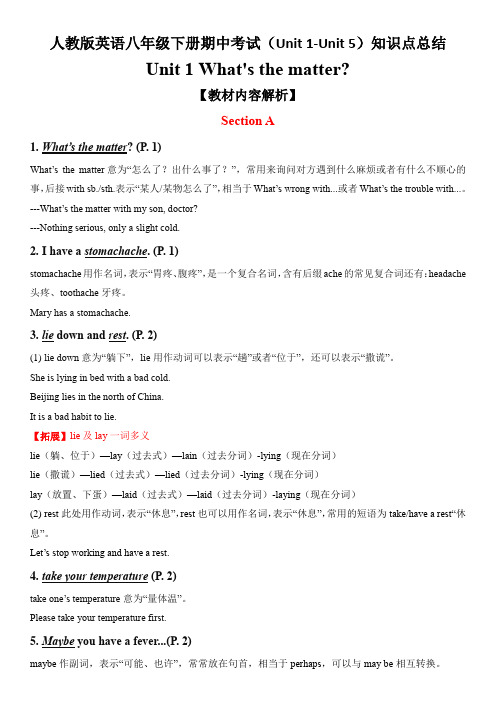
人教版英语八年级下册期中考试(Unit 1-Unit 5)知识点总结Unit 1 What's the matter?【教材内容解析】Section A1.What’s the matter? (P. 1)What’s the matter意为“怎么了?出什么事了?”,常用来询问对方遇到什么麻烦或者有什么不顺心的事,后接with sb./sth.表示“某人/某物怎么了”,相当于What’s wrong with...或者What’s the trouble with...。
---What’s the matter with my son, doctor?---Nothing serious, only a slight cold.2.I have a stomachache. (P. 1)stomachache用作名词,表示“胃疼、腹疼”,是一个复合名词,含有后缀ache的常见复合词还有:headache 头疼、toothache牙疼。
Mary has a stomachache.3.lie down and rest. (P. 2)(1)lie down意为“躺下”,lie用作动词可以表示“趟”或者“位于”,还可以表示“撒谎”。
She is lying in bed with a bad cold.Beijing lies in the north of China.It is a bad habit to lie.【拓展】lie及lay一词多义lie(躺、位于)—lay(过去式)—lain(过去分词)-lying(现在分词)lie(撒谎)—lied(过去式)—lied(过去分词)-lying(现在分词)lay(放置、下蛋)—laid(过去式)—laid(过去分词)-laying(现在分词)(2)rest此处用作动词,表示“休息”,rest也可以用作名词,表示“休息”,常用的短语为take/have a rest“休息”。
2020-2021学年人教版英语八年级下学期期中复习Unit1-Unit5单元短文填空10篇(有答案

Unit 1 What’s the matter?题1:off,time,dress,bad,hit,because, ride,friend,angry,hurtIt wasn't a lucky day for me today. I wanted to get up at half past six, but I couldn't t. I fell out of my bed and 1. ________ my right hand. When I stood up, I 2.______ my head on the table. Then I got 3._______and went to the kitchen.I started to make my breakfast,I burned(烫伤)my arm. I didn't have breakfast,4.________ it was half past seven and I had to leave for school.Lessons start at 8:00.I ran to the bus stop, but I still missed the bus. So I had to run home for bike and 5.________ it to school.On the way,I fell 6.________ the bike and hurt my knees. When I arrived at school, it was 8:15.My teacher was 7.________.After school, I played soccer with my 8. ________ in the park. I fell down and hurt my left leg 9.______. My friends called the ambulance(救护车).They couldn't take me to the hospital in 10.________because the ambulance had an accident on the road.1.__________2.__________3.__________4.__________5.__________6.__________7.__________8.__________9.__________ 10.__________1.hurt2.hit3.dressed4.because5.role6.off7.angry8.friends9.badly 10.time题2:Jenny has a small clinic(诊所).She had a busy day today. One boy hurt his 1. _______(knee) inP.E. class. When he was running in the hot sun, he felt sick and then he 2. _______(fall) down. Something cut his knees. 3. _______(lucky),his cuts were not serious. Jenny washed his cuts and put some medicine on them.She told him 4. _______(lie) down and have a good rest.Later, a girl came and said she had a bad headache and had problems 5. _______(breathe). Jenny took her temperature and found she had 6. _______ fever.She gave her an injection (注射)and some medicine. She asked her to drink more water and told her the 7. _______(important) of keeping healthy. Anotherboy got hit 8. _______ his head by a soccer ball. She told him to go to a big, hospital 9. _______ that he could get an X-ray. Jenny said that it's necessary for us to take good care of 10. _______(we).1.__________2.__________3.__________4.__________5.__________6.__________7.__________8.__________9.__________ 10.__________1.knees2.fell3.Luckily4.to lie5.breathing6.a7.importance8.on9.so 10.ourselvesUnit 2 I’ll help to clean up the city parks.题1:My parents have a friend who always helps out 1._______(无家可归的) people.His name is Richard and he is very 2._______(success).Last Sunday, he called our house and asked me if I would like 3._______(help) those homeless people. I was a little surprised and I said OK.We spent most of the day 4._______(serve) food to homeless people. After the meal,those people listened to Richard talk about how to go back to school and how to get a job. It was a great talk. Those people thanked Richard a lot when he finished 5._______(谈话).6._______the way home,Richard told me that it made him7._______(感觉) good to help others. I told him that it made me feel good,too.I also told him I thought they really needed help.Richard said some people 8._______(think) homeless people were lazy, but he didn't agree. In9.________opinion, people lived on the street for many complicated(复杂的)10._______(原因).And once they started living on the street, it was difficult for them to get off it.He said that he knew one kid who got off the street, went back to school and became successful.1.__________2.__________3.__________4.__________5.__________6.__________7.__________8.__________9.__________ 10.__________1.homeless2.successful3.to help4.serving5.talking6.On7.feel8.thought9.his 10.reasons 题2:use change imagine midnight set difficulty several raise strong satisfactionDo you know Craig Kielburger? At the age of 12,he started a group to help kids all over the world.How did Craig start? In the seventh grade,1._______ things made him angry.A young Pakistaniboy was sent to work in a factory. The boy could not go to school or play. He even worked at 2._______ Craig and his friends decided 3._______ up Free the Children to help those kids. Craig and his friends agreed that Free the Children should 4._______ money to build schools because getting education could5._______ poor kids' lives.Today,Craig's charity(慈善团体)has more and more members in many countries. It's getting6._______. Craig gets a feeling of7._______, but he still remembers that some people8._______ tolaugh at his idea. There were so many 9._______.You could 10._______ how upset Craig was at that time. However, Craig didn't give up. Now he wants more people to help kids.If you want to help poor kids, please join Free the Children.1.__________2.__________3.__________4.__________5.__________6.__________7.__________8.__________9.__________ 10.__________1.several2.midnight3.to set4.raise5.change6.stronger7.satisfactioned 9.difficulties 10.imagineUnit 3 Could you please clean your room?题1:shirt rubbish however read mess what anything pass big surprised One afternoon a man came home from work. He was surprised to find a 1.___________ in hisyard(院子).His three children were outside, playing in the mud(泥).When he came into the house, he found an even 2._______ mess.The TV was on, and the family room was full of clothes:3._______ ,shoes and so on. In the kitchen,4._______ was everywhere. A broken glass lay on the floor.He5._______ through the family room, looking for his wife.He was worried that she might be ill.6._______ ,he found her7._______ in the bedroom. He looked at her in8._______ and asked, “What happened here today?”She answered,“Every day when you come back, you ask me 9._______ I did.”“Yes,”he replied.“Well, today I didn't do 10._______ !”answered his wife.1.__________2.__________3.__________4.__________5.__________6.__________7.__________8.__________9.__________ 10.__________1.mess2.bigger3.shirts4.rubbish5.passed6.However7.reading8.surprise9.what 10.anything 题2:It is necessary for us teenagers to do some chores.By doing them,we can help our parents and understand them better. We can also learn to look after 1.________(our).However,Matt 2.________(hate) doing chores.He has to do the dishes on Mondays and Tuesdays.He has to take out the rubbish on Wednesdays,Thursdays and Fridays. And on weekends he has to sweep3.________ floor. Sometimes he even needs to take care4.________ his 10-year-old brother.He knowshis parents are just trying to make him more independent. But he thinks it' s 5.________(fair)forhim. He doesn't mind 6.________(do)chores,but his brother should do some housework,7.________ Jason is Matt's classmate and is also one of his 8.________(neighbor). In his family, only the girlsdo chores.His two sisters make all the beds and clean all the rooms,even his bedroom.One day,Matt asked Jason,“Could I 9.________(borrow)your sisters? They can help me do chores." When Jason heard this,he laughed,“Of course, you promise 10.________(give) them back."1.__________2.__________3.__________4.__________5.__________6.__________7.__________8.__________9.__________ 10.__________1.ourselves2.hate3.the4.of5.unfair6.doing7.too8.neighbors9.borrow 10.to giveUnit 4 Why don’t you talk to your parents题1:Do you want to make friends 1.________ others? Please remember to 2.________ your words all the time. In this way,people around you will get along 3.________ with you.To make friends and keep them, you have to keep your words.If you agree 4.________(meet) someone at a certain time, you should arrive at the place on time or a little 5.________(early). If you agree to help others, you must do it. Of course if there is 6.________unexpected (没有预料到的) happening and you can't do what you have promised to do, your friends will 7.________(懂得)this.If someone is always 8.________(说谎)or making excuses for breaking his words. Would you like to have him as one of your 9.________(最好的) friends? You wouldn't. And your own friends feel the same way.So be more careful when you have to 10.________(agree) to do something for your friends. Don't have “Maybe”in your mind when you say something about what you are going to do.1.__________2.__________3.__________4.__________5.__________6.__________7.__________8.__________9.__________ 10.__________1.with2.keep3.well4.well5.earlier6.something7.understand8.lying9.best 10.agree题2:nervous, push, boring, return, argue, late, whatever, cloud, deal, how, problem, swimAda was Rachel's stepsister (继妹). Ever since they came to live in one family,it seemed that theycouldn't stop fighting.One day they were fighting again.“Stop 1.________,girls!” said their dad. “I'll make a(n) 2._______ with you.Get through this morning without fighting, and you can do 3.________ you want this afternoon."The girls looked at each other.“All right,”they agreed.They went boating together.Rachel showed Ada4.________ to paddle(用桨划船).“We need to work together,"Rachel said.“This is 5.________,”Ada said. An impatient(不耐烦的)look appeared on her face.When they made it to the middle of the lake,Ada felt a strong wind. She looked up.Dark 6.________ filled the sky. Rachel said, “We'd better turn around."The wind blew harder.Ada was quite 7.________. She stood up and called for help.“Ada,no!” Rachel shouted. “Sit down!” It was too 8.________. The boat turned over. They fell into the water.“Grab(抓住)the boat,”Rachel told Ada.“We have to 9.________back to the shore(岸).”Ada was scared,but Rachel helped her.“You're doing great,” Rachel said over and over. Te n minuteslater they 10.________ to the shore.Ada took Rachel's hand and said, “Thank you.”Rachel smiled as she said, “This is what a sistershould do.”1.__________2.__________3.__________4.__________5.__________6.__________7.__________8.__________9.__________ 10.__________1.arguing2.deal3.whatever4.how5.boring6.clouds7.nervouste9.swim 10.returnedUnit 5 What were you doing when the rainstorm came?题1:I always remember a thing that 1._______(happen) last month. When I was walking on 2._______ way home, I felt a little tired and wanted to have a rest. So I sat on a bench(长椅)to 3._______(享受) the warm sunshine in the ter, an old man sat next to me. His clothes were old and dirty and his face was pale.It seemed that I should do 4.______ to help him.So I quickly went to a shop near the park and 5._____(买) some food and water for him. When I 6._______(return)to the park,he was still sitting there alone. So I sat next to him and gave the food and water to him. We talked a lot in the following two hours. Before I left,he told me that it was the 7._______(happy) day for him during nearly ten years. He said that most people chose to leave far away from him instead of 8._______(stay) with him when they saw him.Then I realized that9._______(kind)could really warm others a lot when they were in need.Sometimes, we just needed a10._______ (机会)to open our hearts to other people.I felt happy that I had such a chance that day.1.__________2.__________3.__________4.__________5.__________6.__________7.__________8.__________9.__________ 10.__________1.happened2.my3.enjoy4.something5.bought6.returned7.happiest8.staying9.kindness 10.chance题2:Ben could hear strong winds outside his home in Alabama. Black 1._______(cloud) were making the sky very dark. With no light outside, it felt like midnight.The news on TV 2. _______(report) that a heavy rainstorm was in the area.Everyone in the neighborhood was busy. Ben's dad was putting pieces of wood over the windows while his mom was making sure the flashlights and radio 3._______(be) working. She also put some candles and 4._______(match) on the table.Ben was helping his mom make dinner when the rain began to beat 5._______(heavy)against the windows. After dinner, they tried to play a card game, but it washard 6._______(have) fun with a serious storm happening outside.Ben could not sleep 7._______ first. He finally fell asleep when the wind was 8._______(die) down at around 3:00 a.m. When he woke up, the sun was rising.He went outside with his family and found the neighborhood in 9._______ mess.Fallen trees, broken windows and rubbish were everywhere.They joined the neighbors to help clean up theneighborhood together. 10._______ the storm broke many things apart, it brought families and neighbors closer together.1.__________2.__________3.__________4.__________5.__________6.__________7.__________8.__________9.__________ 10.__________1.clouds2.reported3.were4.matches5.heavily6.to have7.at8.dying9.a 10.Although/Though。
人教版英语八年级(下)Units1-5单元复习考试试题(有答案)

人教版英语八年级(下)Units1-5单元复习考试试题(有答案)八年级(下)Unit1-Unit5复习I. 核心词汇突破1. The sign m______ (意味着) that we can’t make any noise here.2. Westerners eat with k______(刀) and forks, while we Chinese eat with chopsticks.3. We organized two talent shows to r______ (筹集) money for the people in trouble.4. Could you please ______(借) me your dictionary?5. The boy was very angry and t______(扔) down his schoolbag.6. It snowed heavily last night, so a car h______ (撞击) a tree by accident a moment ago.7. The little girl felt e_______(激动的) when she saw her mother.8. If my car can be r______(修理), I won’t buy a new one.9. L______(躺) on the beach is comfortable. It’s a good way to relax ourselves.10. Our personality will not remain the same throughout our life. It c______(改变) much from young age to old age.11. If you are not s______ (满意的) with the present situation, you’d better try to make yourself more excellent.12. Parents always try to ______ (提供) a comfortable environment for their children.13. Driving after drinking isn’t a______(允许) because it may lead to traffic accidents.14. Tom’s mom felt proud of him because he p_____ (通过) the interview of a big company.15. It’s not the p______ (恰当的) way to deal with the matter.16. The police wanted to find out what c______ (引起) the fire accident.17. She is used to a______ (争吵) with her husband, which has become their lifestyle.18. The sunshine s______ (照耀) through the window and I start feeling a little warmer.19. The wall of our classroom is made of glass, which makes it b______ (明亮的) than before.20. He was so sleepy that he fell asleep a______ (靠着) a tree.II. 核心短语突破。
人教版八年级英语下册1-5单元知识点归纳
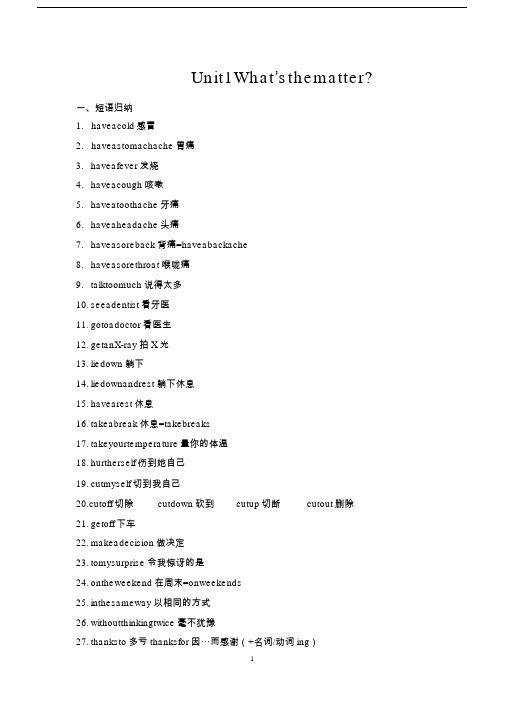
Unit1What’sthematter?一、短语归纳1.haveacold感冒2.haveastomachache胃痛3.haveafever发烧4.haveacough咳嗽5.haveatoothache牙痛6.haveaheadache头痛7.haveasoreback背痛=haveabackache8.haveasorethroat喉咙痛9.talktoomuch说得太多10.seeadentist看牙医11.gotoadoctor看医生12.getanX-ray拍X光13.liedown躺下14.liedownandrest躺下休息15.havearest休息16.takeabreak休息=takebreaks17.takeyourtemperature量你的体温18.hurtherself伤到她自己19.cutmyself切到我自己20.cutoff切除cutdown砍到cutup切断cutout删除21.getoff下车22.makeadecision做决定23.tomysurprise令我惊讶的是24.ontheweekend在周末=onweekends25.inthesameway以相同的方式26.withoutthinkingtwice毫不犹豫27.thanksto多亏thanksfor因⋯而感谢(+名词/动词ing)28.intime及时ontime按时29.savealife挽救生命30.getintotrouble陷入麻烦31.rightaway马上32.falldown跌倒33.waitfor等待34.beinterestedindoingsth.对做某事感兴趣35.giveup放弃二、用法集萃1.询问有什么病或有什么麻烦:What’sthematter(withsb.)?2.疾病的表达:have/hasa+疾病名称3.太多:toomuch+不可数名词;toomany+可数名词复数形式太:muchtoo+形容词4. enough足够的:①形容词+enough②enough+名词③itisenough+todosth.5. lie躺下过去式:lay现在分词:lying6.seesb.doingsth.看见某人正在做某事(正在进行)seesb.dosth.看见某人做了某事(看见动作的全过程)7.expecttodosth.期望做某事8.needtodosth.需要做某事9.helpsb.(to)dosth.帮助某人做某事10.tellsb.(not)todosth.告诉某人(不要)做某事11.asksb.todosth.要求某人做某事12.wanttodosth.想要做某事13.agreetodosth同.意做某事disagreetodosth.不同意做某事agreewithsb.同意某人的意见14.trouble问题;麻烦havetrouble/problemdoingsth.做某事有困难15.介词+doing常见的介词有:at;for;with;without;inabout16.be/getusedtodoingsth.习惯于做某事17.keepondoingsth.继续做某事18.minddoingtsh.介意做某事19.反身代词:myself我自己yourself你自己himself他自己herself她自己itself它自己复数:ourselves我们自己yourselves你们自己themselves他们自己20.knife-knives刀名词复数规则变化:①一般情况+s②以e结尾+s③以s、x、ch、sh结尾+es④以辅音字母+y结尾,变y为i+es⑤以o结尾,有生命+es;无生命+s⑥以f/fe结尾,变f/fe为v+es不规则变化:foot-feet脚、足tooth-teeth牙齿man-men男人woman-women女人mouse-mice老鼠21.important重要的importance重要性different不同的difference差异性22.death死亡(名词)die死(动词)dead死的(形容词)三、书面表达Howtokeephealthy如何保持健康Healthisimportant.Everyonewantstobehealthy.Letmetellyouhowtokeephealthy.Firstofall,weshouldeathealthyfood.Weshouldeatmorevegetablesandfruit.Wealson eedtodrinkmilk.Secondly,weshouldexercisealot.Weshoulddosomesportsafterschool.Finally,weshouldhaveenoughsleep.Tohaveagoodrest,weshouldgotobedearlyandgetupearly.Ithinkitisimportantforustokeephealthy.3Unit2I’llhelptocleanupthecityparks.一、短语归纳1. cleanup打扫干净cheerup使兴起来代词放中间2.giveout分发3.handout分发eupwith想出;提出(idea、plan等)5. putoff推迟puton穿衣服putup张贴putaway把⋯收好6.callup打电话;征召edtodosth.曾经做某事beusedtodingsth习.惯于做某事8. lonely孤独的(常用于feel之后)alone独自一人9.carefor照顾=takecareof10.afeelingofsatisfaction一种满足感11.tryout参加⋯选拔12.raisemoney募捐13.fixup修理14.giveaway赠送(money、oldclothes/books等)giveup放弃15.takeafter(外貌或行为)像16.besimilarto与⋯相似17.setup建立18.makeadifference影响;有作用19.disabledpeople残疾人20.makeaplan制定计划21.oldpeople’shome养老院22.helpoutwithsth.帮助解决困难23.abooklover书迷24.attheageof在⋯岁时etrue实现(与dream连用)26.atthesametime同时27.homelesspeople无家可归的人28.beworriedabout为⋯而担心worryabout担心29.forexample例如30.runoutof用完31.not⋯anymore不再32.atonce立刻;马上=rightaway二、用法集萃1.volunteertodosth自愿做某事2. difficult困难的difficulty困难havedifficulty(in)doingsth.做某事有困难3.excited兴奋的(人作主语)exciting使人兴奋的(物作主语)口诀:人+ed物+ing4.疑问词(how,what,where)+todo5. decidetodosth.决定做某事名词形式:decision makeadecision做决定6.learntodosth.学习做某事7.agoodwaytodosth.做某事的好方法8.wouldliketodosth.=wanttodosth.想要做某事9.thankyouforsth./doingsth.因某事/做某事而感谢10.kind善良的kindness善意Unit3Couldyoupleasecleanyourroom?一、短语归纳1.dothedishes清洗餐具2.takeouttherubbish倒垃圾3.foldtheclothes叠衣服foldmy/your/hisclothes4.sweepthefloor扫地5.makethebed铺床makemy/your/hisbed6.cleanthelivingroom打扫客厅7.helpoutwithsth.帮助解决某事8.atleast至少eover过来;顺便来访10.infrontof在⋯前面11.takethedogforawalk遛狗12.allthetime一直13.assoonas一⋯就⋯14.insurprise惊讶地15.hangout闲逛16.dochores做家务17.awasteoftime浪费时间18.inorderto为了19.getgoodgrades取得好成绩20.dependon依靠21.takecareof=carefor=lookafter照顾22.asaresult结果23.fallill生病二、用法集萃1.finishdoingsth.完成做某事2.if如果(主将从现,if后为从句,用一般现在时);是否(位于动词之后)3.assoonas一⋯就⋯.主将从现,assoonas后为从句4.replyangrily生气地回答(副词修饰动词,一般位于动词之后)abeautifuldog一只漂亮的狗(形容词修饰,名词,位于名词前)口诀:形名动副5.beangrywithsb.生某人的气6.as+形容词原级+as和⋯一样7.neitherdidI我也没有neither+be动词/助动词(do/does/did)/情态动词+主语“主语也不⋯..”so+be动词/助动词(do/does/did)/情态动词+主语“主语也⋯”8.can-could可以can,could还可以表示请求,could比can更有礼貌肯定回答:Sure./Ofcourse./Noproblem./Yes,sure.否定回答:No,youcan’t./Sorry,Ican’t.9.asksb.todosth.要求某人做某事10.borrow⋯from⋯跟⋯借(借进来)lend⋯to⋯把⋯借给⋯.(借出去)11.invitesb.todosth.邀请某人做某事12.helpwithsth.helpsb.(to)dotsh.帮助做某事13.havetimetodosth.有时间做某事havenotimetodosth没.时间做某事14.letsb.dosth.让某人做某事15.makesb.dosth.让某人做某事16.spend花费人+spend+时间+onsth/doingsth在某事上花时间/花时间做某事cost花费物+cost+金钱$某物花了多少钱take(took)花费Ittakes/tooksb.+时间+todo.做某事花了某人多少时间payfor付费17.itis+adj(forsb.)+todosth.做某事对某人而言是⋯的18.fair公平的unfair不公平的fairness公平性19.doone’spartindoingsth.尽自己的职责做某事20.the+比较级,the+比较级越...越⋯比较级and比较级越⋯越⋯theearlier⋯thebetter越早越好betterandbetter越来越好Unit4Whydon’tyoutalktoyourparents?一、短语归纳1.talkto/withsb.与某人交谈talkaboutsth.谈论某事2.freetime空闲时间3.allowab.todosth.允许某人做某事allowdoingsth.允许做某事4.hangout闲逛5.getintoafight争吵;打架6.sothat为了;以便于7.lookthrough浏览;快速查看8.workout成功地发展;解决9.getonwith/getalongwith和睦相处municatewithsb.与某人交谈11.abigdeal重要的事petewithsb.与某人竞争13.examskills应试技巧14.cutout删除pare⋯with⋯比较16.not..until直到⋯才17.arguewithsb.与某人争吵18.noproblem没问题19.not..anymore不再20.inmyopinion依我看21.thanksfor因⋯而感谢22.allkindsof各种各样的23.worryabout为⋯而担心=beworriedabout二、用法集萃1.提建议句型:①Youshould/shouldn’t dosth.②How/Whataboutdoingsth.?③Whydon’tyoudosth.?④Whynotdosth.?⑤Shallwedosth.?⑥Let’sdosth.⑦You’dbetterdosth.⑧Wouldyouminddoingsth.?常见回答:Goodidea./Soundsinteresting./I’dliketo./Great.否定:I’dloveto,butIhaveto⋯/Sorry,Ican’t.2.beangrywithsb.生某人的气3. although/though虽然不与but连用4.advice建议(不可数名词)5.refusetodosth.拒绝做某事6.instead代替;反而(位于句首或句尾)insteadof代替(位于句中)7.offertohelp提供帮助8.minddoingsth.介意做某事9.continuetodo/doingath.继续做某事10.keepondoingsth.继续做某事11.afew一些(肯定)few一点点(否定)修饰可数名词复数形式alittle一些(肯定)little一点点(否定)修饰不可数名词做题步骤:先看横线后的名词,判断可数还是不可数;其次,理解句子表达的肯定还是否定12.it’s timeforsth.该做某事了=it’stimetodosth.pete竞争(动词)competition竞争(名词)14.havetimetodosth有.时间做某事Unit5Whatwereyoudoingwhentherainstormcame?一、短语归纳1.gooff闹钟发出响声2.rainheavily下大雨3.pickup接电话;采摘4.atfirst起先5.fallasleep进入梦乡6.diedown逐渐变弱7.havealook看一看8.makeone’sway费力地前进9.insilence沉默10.takedown拆除;往下拽;记录11.atthetimeof⋯当⋯.的时候12.waitfor等待13.atthattime在那时(一般过去时标志词)14.wakeup醒来15.goshopping去购物16.takeashower洗澡17.inamess乱七八糟18.forexample例如19.makesure确保二、用法集萃1.过去进行时定义:表示在过去某一时刻或某一时间段正在进行的动作。
人教版八年级下册Unit1-5 (期中)知识点归纳与总结

已排版好可直接打印使用巧思妙解提升思维能力Unit1-5知识点归纳与总结Unit1Where did you go on vacation?一、重点单词复合不定代词:(anyone,anywhere,something,nothing,everyone,someone);wonder,wonderful;反身代词:(myself;yourself);few;most;bored;decide;try;difference;enough;below,umbrella二、重点短语1.go on vacation去度假2.too many太多(后跟可数名词复数)3.quite a few相当多4.study for a test为考试学习5.taste good尝起来味道好6.have a good time=have fun玩得开心7.of course当然可以8.feel like感觉像……/想要9.something important重要的事情10.because of因为(+名词,代词或名词性词)11.most of the time大多数时间12.arrive in到达13.Long time no see好久不见14.keep a diary写日记15.go to the mountains去爬山16.go to the beach到海边去17.visit the museums参观博物馆18.go to summer camp去夏令营19.go out出去20.go shopping购物21.in the past在过去22.walk around四处走走23.one bowl of rice一碗米饭24.find out查出来/发现25.go on继续26.stay at home呆在家27.take photos照相28.up and down上上下下e up升起,出来三、习惯用法、搭配1.buy sth.for sb./buy sb.sth.为某人买某物(sb.某人;sth.某物)★2.taste+adj.尝起来……(adj.形容词)3.arrive in+大地方/arrive at+小地方到达某地★4.decide to do sth.决定做某事(to do表示动词不定式,就是在动词原形前加to)★5.try doing sth.尝试做某事/try to do sth.尽力做某事6.enjoy doing sth.喜欢做某事7.want to do sth.想去做某事8.start doing sth.=start to do sth开始做某事9.stop doing sth.停止做某事10.look+adj看起来11.dislike doing sth.不喜欢做某事12.Why not do sth.?=Why don’t you do sth?为什么不做…….呢?13.so+adj+that+从句如此……以至于……★14.tell sb.(not)to do sth.告诉某人(不要)做某事15.keep doing sth.继续/不停做某事16.★16.forget to do sth.忘记去做某事/forget doing sth忘记做过某事四、重点句子--Where did you go on vacation?你到哪里去度假了?---I went to New York City.我去了纽约城--Did you go out with anyone?你和他人出去的吗?--No,No one was here.Everyone was on vacation.不,没有人在这儿。
人教版八年级英语下册各单元语法点汇总
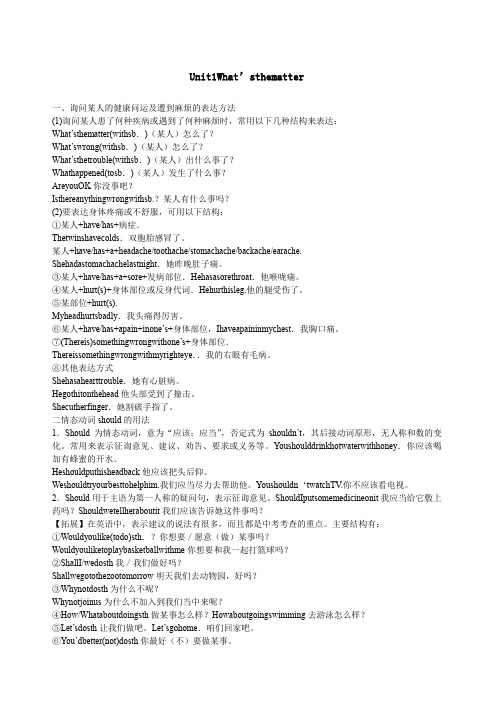
Unit1What’sthematter一、询问某人的健康问运及遭到麻烦的表达方法(1)询问某人患了何种疾病或遇到了何种麻烦时,常用以下几种结构来表达:What’sthematter(withsb.)(某人)怎么了?What’swrong(withsb.)(某人)怎么了?What’sthetrouble(withsb.)(某人)出什么事了?Whathappened(tosb.)(某人)发生了什么事?AreyouOK你没事吧?Isthereanythingwrongwithsb.?某人有什么事吗?(2)要表达身体疼痛或不舒服,可用以下结构:①某人+have/has+病症.Thetwinshavecolds.双胞胎感冒了。
某人+have/has+a+headache/toothache/stomachache/backache/earache. Shehadastomachachelastnight.她昨晚肚子痛。
③某人+have/has+a+sore+发病部位.Hehasasorethroat.他喉咙痛。
④某人+hurt(s)+身体部位或反身代词.Hehurthisleg.他的腿受伤了。
⑤某部位+hurt(s).Myheadhurtsbadly.我头痛得厉害。
⑥某人+have/has+apain+inone’s+身体部位,Ihaveapaininmychest.我胸口痛。
⑦(Thereis)somethingwrongwithone’s+身体部位.Thereissomethingwrongwithmyrighteye..我的右眼有毛病。
⑧其他表达方式Shehasahearttrouble.她有心脏病。
Hegothitonthehead他头部受到了撞击。
Shecutherfinger.她割破手指了。
二情态动词should的用法1.Should为情态动词,意为“应该;应当”,否定式为shouldn’t,其后接动词原形,无人称和数的变化。
- 1、下载文档前请自行甄别文档内容的完整性,平台不提供额外的编辑、内容补充、找答案等附加服务。
- 2、"仅部分预览"的文档,不可在线预览部分如存在完整性等问题,可反馈申请退款(可完整预览的文档不适用该条件!)。
- 3、如文档侵犯您的权益,请联系客服反馈,我们会尽快为您处理(人工客服工作时间:9:00-18:30)。
Unit1:What’s the matter?一.语法重点1.情态动词should的用法2.反身代词二.作文话题:谈论健康三.重要词汇句型1.have a +疾病名词(得了......病)2.询问病人病情的句型(也可用于发生了什么事)What’s wrong?What’s wrong with you?What’s your trouble?What’s the trouble with you?What’s wrong?3.4.If 引导的条件状语从句(主将从现)5.surprise:(1)surprise sb.吓到某人 (2)be surprised at对......感到吃惊 (3)be surprised to do sth.做某事令人感到吃惊 (4)in surprise惊奇地6.agree:(1)agree to do sth. 同意做某事(2)agree with sb. 同意某人(3)agree on sth.双方就某事达成一致(4)agree that+that从句同意......7.trouble:(1)get into trouble陷入困境(2)be in trouble处于困境(3)get sb. into trouble使某人陷入困境(4)have trouble with sth.在某事方面有困难(5)have trouble (in) doing sth.在做某事方面有困难e(1)be/get used to doing sth.习惯于做某事(2)used to do sth.过去常常做某事(3) sth. be used to do......某物被用来做(表被动关系)......(4)sth. be used for doing sth.某物用于/被用于做某事(强调用途)9.take a risk/take risks冒险at risk在危险中at the risk of doing sth.冒生命危险做某事10.run out(花光:物作主语) run out of(人作主语)=use up11.mean to do sth.打算做某事 mean doing sth.意味着做某事12.important(adj.)----unimportant(adj.不重要的)----importance(n.)13.be in control of 掌管,控制14.cut词组:1. cut out删除;删去 2. cut up切碎 3. cut off切掉;停止4. cut down砍到;降低5. cut in插嘴;超车;插队Unit2: I’ll help to clean up the city parks.一.语法重点1.动词不定式2.动词短语二.作文话题:提供帮助,义务活动三.重要词汇句型1.volunteer:v.自愿(做某事) volunteer to do sth. volunteer for sth.n. 志愿者adj. 志愿的;自愿的 a volunteer job2.疑问词+动词不定式=宾语从句I really can’t decide where I should go.=I really can’t decide where to go.3.such+a(n) +形容词+名词=so+形容词+a(n)+名词She is such a beautiful girl.=She is so beautiful a girl.4.satisfaction(n.满意)--satisfy(v.使满意)--satisfied(adj.满意的)--satisfying(令人满意的)to one’s satisfaction使/令某人满意/满足 be satisfied with对......感到满意 be satisfied to do sth. 对做某事感到满意5.raise...for...为...筹集...6.look like外表上看起来像 take after指因血缘关系在性格,性格,行为上相像7.make/think/find/believe/feel it +形容词+to do sth. 使/觉得/发现/相信/感觉做某事......8.make a difference to对......产生影响9.imagine: (1)imagine doing sth.想象做某事(2)imagine sb. to do sth.想象某人做某事(3)imagine that/what 想象......10.train: v. 训练 n. 火车 training n.训练;培训(1)train sb./sth. to do sth.训练某人/某物去做某事(2)train sb. in sth. 在某方面训练/培养某人11.understand=follow=catch理解;听懂understanding adj.善解人意的;体谅人的12.change v. 改变;变化 change one’s life change...into...n. 零钱(不可数名词)改变(可数名词changes)13.短语:cheer up (使)变得高兴;振奋起来give out分发;散发come up with想出;提出put off推迟hand out分发call up打电话给某人;征召care for照顾;非常喜欢try out 参加.....选拔;试用fix up修理;装饰give away赠送;捐赠take after(外貌或行为)像Unit3:Could you please clean your room?一.语法重点1.情态动词could用法(请求和征求许可)二.作文话题:对某事某物的看法(议论文)三.重要词汇句型1.in a mess乱糟糟;一团糟 make a mess of (doing) sth. 把(做)某事搞得一团糟2.so +助动词/系动词/情态动词+主语 (也)neither助动词/系动词/情态动词+主语 (也不)He will go to Hangzhou for a holiday tomorrow. So will I.3.pass v. 经过;穿过 pass the supermarket通过(考试;会议);合格或者及格 pass the final exam(时间的)过去,流逝 A year passed quickly.4.borrow sth. borrow sth. from sb. (借进:说话人向别人借东西)lend sb. sth. lend sth. to sb. (借出:说话人把自己的东西借给别人keep“借”或“保留”多长时间,与一段时间连用5.make:(1)make sb. do sth. I made my mother laugh.(2)make+宾语+形容词(宾语补足语) I made my mother sad.6.waste: a waste of 浪费 a waste of moneywaste sth.浪费某物 waste sth. in doing sth.浪费......做某事7.provide 提供;供应provide sb. with sth.= provide sth for sb.supply sb. with sth.=supply sb. with sth.offer sb. sth=offer to do sth.8.develop(v.发展)--developed(adj.发达的)--developing(adj.发展中的)--development(n.发展)develop one’s interest in培养某人对......的兴趣9.drop与fall 落下;掉下;降下(作不及物动词时,一般可互换)drop还可作及物动词,而fall 不可10.短语:depend on依靠;依赖take care of 照顾;处理Unit4: Why don’t you talk to your parents?一.语法重点1.提建议和回答提建议的表达方式2.until, so that及although引导的状语从句二.作文话题:就某一现象提建议三.重点词汇句型1.allow sb. to do sth.允许某人做某事allow doing sth.允许做某事2.find sb. doing sth.发现某人正在做某事 find sb. to do sth. 发现某人做了某事3.get on (well/badly)with sb. 与某人相处的好/坏4.argue with sb. about sth. 为某事与某人争论7.offer to do sth.主动提出做某事 offer sb. sth.=offer sth. to sb.给某人提供某物municate with sb.与某人沟通,交流communicate sth. to sb.把......通知/传达给某人9.return sb. sth= return sth. to sb.=give back10.not ...any more(不再)=no morenot...any longer=no longer(不再)11.put pressure on sb.向某人施压pete with/against sb.和某人竞争13.continue/go on doing sth.继续做同一件事continue/go on to do sth.继续做某事(不是同一件事)pare A with B把A与B做对比/比较(用来比较相似事物的不同点)compare A to B把A比作B(用来比较不同事物间的相同点)16.cause sb. to do sth.促使某人做某事cause sth. (to/for sb.)(给某人)带来......17. 词组:look through快速查看;浏览work out成功的发展;解决get on with和睦相处;关系良好cut out删除;删去compare...with比较;对比Unit5: What were you doing when the rainstorm came?一.语法重点1.过去进行时2.when与while的区别二.作文话题:描述过去发生的某件事三.重点词汇句型1.light: 1)n. 光;光线(不可数名词) 2)n. 电灯;光源(可数名词)3)adj.轻的;浅色的4)v. 点燃;照亮 light---lighted/lit---light/lit2.report v.报告 n. 报告 reporter n. 记者3.wood n. 木头;木(不可数名词)小树林(可数名词,常用复数)wooden adj.木制的4.beat 1)v. 击打 2)心脏等跳动 3)打败;战胜(后接人或由人组成的队)5.against 1)反对 for支持 We are against war and for peace.2)靠着,倚着 The boy stood against the door.2)实现(梦想、愿望)realize one’s dream=make one’s dream come true=achieve one’s dream8.make one’s way to......在某人去......的路上,前往......途中9.短语:at first 起初;起先fall asleep进入梦乡;睡着die down逐渐变弱;逐渐消失make one’s way前往;费力地前进take down拆除,往下拽;记录go off水电断掉;离开;爆炸;食物变坏。
